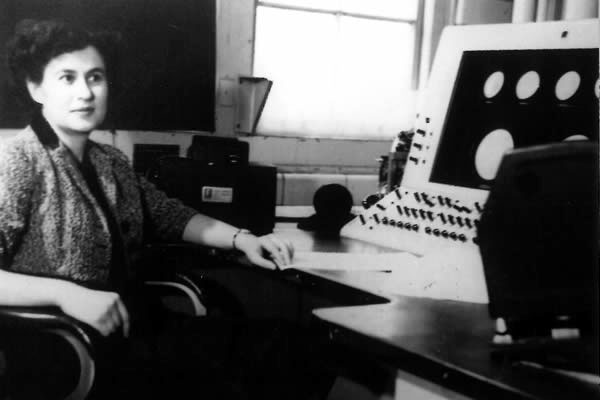
Honouring Canada's first female computer scientist: U of T's Trixie Worsley
Published: May 26, 2015
She is believed to be the first woman in the world to earn a doctorate in computer science and Canada's first female computer scientist.
Now, the University of Toronto's Beatrice Helen Worsley (1921-1972) – known to friends and colleagues as “Trixie” – has been recognized for her lifetime of achievement by the Canadian Association of Computer Science / Association d'Informatique Canadienne (CACS/AIC).
“At a time when there were very few women involved in computer science, she was not intimidated by entering this new field,” says master’s student Eleni Triantafillou. “As a Canadian, female, computer science student, I admire her contributions and hope that her story can inspire others as well.”
 Worsley completed her undergraduate studies in mathematics and physics at the University of Toronto’s Trinity College in 1944 and soon afterwards enlisted in the Women’s Royal Canadian Naval Service. She served as a harbour defense researcher at the Naval Research Establishment at Her Majesty’s Canadian Ship Establishment Stradacona, in Halifax, NS.
Worsley completed her undergraduate studies in mathematics and physics at the University of Toronto’s Trinity College in 1944 and soon afterwards enlisted in the Women’s Royal Canadian Naval Service. She served as a harbour defense researcher at the Naval Research Establishment at Her Majesty’s Canadian Ship Establishment Stradacona, in Halifax, NS.
Her computing career began when she left the NRE to complete her master’s in mathematics from the Massachusetts Institute of Technology. At MIT, she received exposure to new computer technology through her coursework and research. With a shortage of jobs in computing in Canada, she was later able to negotiate a position as a project assistant at U of T’s newly established Computation Centre for a purported salary of $200 per month.
Her friend, Charlotte Froese Fischer, professor emerita of Vanderbilt University, first learned of Trixie while attending Cambridge University. They later met when Froese Fischer came to complete her studies at the U of T Computation Centre.
“I got to know Trixie and appreciate her insights and her wry humour. She had a way of expressing herself in a few memorable words.”
Established in 1948, the U of T Computation Centre was a precursor to the department of computer science, which today ranks among the top 10 computer science departments worldwide in the prestigious Shanghai Jiao Tong University’s Academic Ranking of World Universities. (See the department of computer science’s 50-year history on a timeline.)
Supervised by Alan Turing at Cambridge
While with the Computation Centre, Worsley and fellow project assistant J. Perham Stanley visited Cambridge University to learn from their Electronic Delay Storage Automatic Calculator (EDSAC), an early computer. There, she decided to undertake doctoral studies in mathematical physics at Newnham College where she was supervised by computer science forerunners Maurice Wilkes and Alan Turing.
 “I read her thesis,” said Froese Fischer. “It started with a classification of computers, including the abstract Turing Machines and the EDSAC.”
“I read her thesis,” said Froese Fischer. “It started with a classification of computers, including the abstract Turing Machines and the EDSAC.”
It is believed Worsley was the first woman in the world to receive a doctorate in computer science. The Institute of Electrical and Electronics Engineers' Annals of the History of Computing cites her dissertation, “Serial programming for real and idealized digital calculating machines” as the first on modern computing.
Worsley was rehired by the Computation Centre where she and J.N. Patterson “Patt” Hume went on to write Transcode, a simplified coding language that could be executed using U of T’s half-million dollar Ferut, Canada’s first electronic computer. (Read more about the late Professor Emeritus Hume in U of T Magazine)
Worsley became an associate professor at U of T and was later promoted to the same faculty position after joining Queen’s University. She was on sabbatical, conducting research at the University of Waterloo, when she died of a fatal heart attack at age 50.
At a ceremony May 21, 2015 the CACS/AIC posthumously recognized Worsley for lifetime achievement alongside her former University of Toronto Computation Centre colleagues Professor Emeritus Patt Hume (1923 - 2013) and Professor Emeritus C.C. Kelly Gotlieb, who was the inaugural chair of the department of computer science from 1964 to 1967.
Award recipients at the association’s annual conference also included U of T's Professor Emeritus Ron Baecker, a digital media pioneer and expert in human-computer interaction whose labs develops technologies for aging (read more about Baecker's work) and Professor Allan Borodin, a former department chair who has made significant theoretical contributions to the field in complexity, online algorithms, resource tradeoffs and models of algorithmic paradigms.
The sixth award went to Harvey Mudd College president Maria Klawe, a former department faculty member and a renowned computer scientist, mathematician and internationally-recognized advocate for women in science, technology, engineering and math (STEM).
Klawe will also receive an honorary degree from the University of Toronto this June. (Read more about this year’s honorary degree recipients.)
Froese Fischer established a U of T computer science graduate scholarship in Worsley’s name, providing funding for PhD candidates who have taken an active role in promoting women in the field of computer science.
"I thought about establishing a scholarship at Cambridge in her memory, but realized that she could be Canada's first female computing pioneer."
Nina Haikara is a writer with the department of computer science at the University of Toronto.


